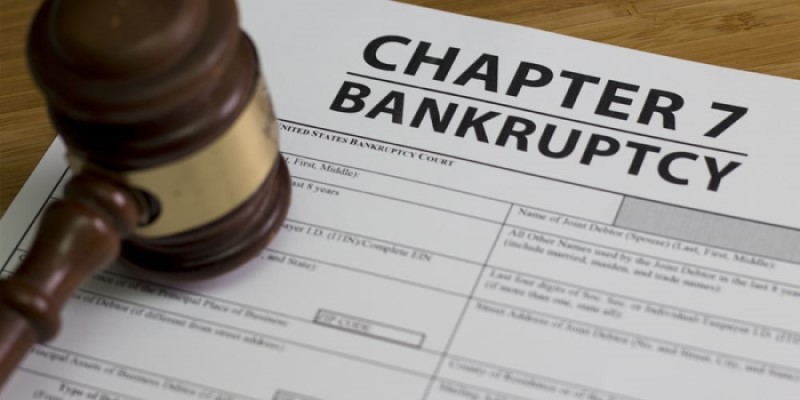
Bankruptcy affects your credit report and future borrowing for many years to come. It is always good to consult a bankruptcy attorney about the other options you may have — debt consolidation, budget management, credit counseling, etc. Bankruptcy should be considered a last resort. That being said, sometimes you cannot avoid bankruptcy. In that case, a bankruptcy lawyer can help you mitigate the impact of bankruptcy on your assets. The situation is challenging for Chapter 7 bankruptcy.
What is Chapter 7 Bankruptcy
Chapter 7 bankruptcy is commonly known as liquidation bankruptcy. The legal term ‘liquidation’ means winding up of assets. It simply means selling assets of an individual or a company when they fail to discharge their debt obligations. This is achieved through auction, and the sale proceeds are used to pay off the creditors. For this reason, Chapter 7 bankruptcy is also called straight bankruptcy. A trustee is appointed by the bankruptcy court, which overlooks the auction procedure. Chapter 7 bankruptcy stays on the borrower’s credit report for seven years and makes borrowing a bit tedious in the future.
Qualifications for Chapter 7 Bankruptcy:
Some prerequisites exist to be eligible to file for Chapter 7 debt relief.
- Individuals are required to complete a credit counseling course before they can file for bankruptcy. The purpose is to mitigate and improve the borrower’s financial management.
- You must not have an ongoing bankruptcy or have not filed for bankruptcy during the past eight to ten years.
- Any fraudulent activity instantly makes you non-eligible for bankruptcy. For instance, credit card shopping with the intent of filing bankruptcy and avoiding repayment.
What can be discharged in Chapter 7 Bankruptcy?
Unsecured small debts
Not all debts can be discharged in Chapter 7 bankruptcy. If you have unsecured debts, their repayment can be easily made through Chapter 7 bankruptcy. Unsecured debts are simply a debt not backed by collateral. Debts like utility bills, medical bills, rent, small personal loans, credit card bills, and other consumer bills are unsecured debts. In an unsecured debt, the creditor does not have the right to take the credit item away in the event of non-payment.
Secured debts backed by collateral
However, for non-dischargeable debts, the creditor has a lien on the credited property. It means that if the borrower fails to repay the debt on the property they are purchasing, the creditor can take possession of it and sell it to cover the debt, or they can sell the collateral to discharge the debt. Therefore, collateral is a security on the debt, and such debts are known as secured debts. Chapter 7 bankruptcy discharges all secured debts — the mortgage on a house or car, etc. However, in some cases, the creditor retains foreclosure rights on the property even after the repayment of secured debt.
Unsecured debts that cannot be discharged through Chapter 7 Bankruptcy
Most unsecured debts are repaid within four to six months of obtaining a bankruptcy order. Consumer bills such as small personal loans, utility bills, rent, government grants, credit card bills, and medical bills are all discharged through Chapter 7 bankruptcy. It is pertinent to mention that not all unsecured debts can be discharged through Chapter 7 bankruptcy. Some unsecured non-dischargeable debts that cannot be discharged under Chapter 7 bankruptcy are;
- Student loans: Student loans are unsecured debts, but they are not discharged under Chapter 7 bankruptcy. Unless you can demonstrate the inability to repay, the student loans remain your financial obligation.
- Child/alimony support: You cannot pay for child or spousal support through Chapter 7 bankruptcy.
- Tax obligations: Chapter 7 bankruptcy does not free you from the tax liabilities and obligations you may have.
- Debts secured through fraud or pretense: If you have taken out a loan by fraud or pretense by tempering with your credit report, such debts are not discharged by the Chapter 7 bankruptcy.
- Items purchased with the intention of not repaying: Some people buy luxury items via credit cards intending never to repay and immediately file for bankruptcy. Such credit card bills are non-dischargeable, and any credit card bill for $850 or more will not be entertained if it is acquired within three months of filing for bankruptcy. The court looks into the recent purchases of the person filing for Chapter 7 bankruptcy to ensure there are no credit card frauds or pretense purchases with the intent of not paying.
- Court fees, bankruptcy attorney fees, legal expenses, or penalties: All kinds of legal expenses — fees of the bankruptcy attorney, court fees to file a bankruptcy petition, or any penalties by the Court are strictly non-dischargeable.
When to consult a Bankruptcy Lawyer?
It is wise to consult a bankruptcy lawyer when your debts are jumping higher than your income. Meeting with a bankruptcy lawyer does not necessarily imply you’re going to file for bankruptcy, but it is always good to explore all of your options according to your situation. The fees of a bankruptcy attorney are different in each locality, and it depends on the experience of the bankruptcy lawyer and how much they charge. Most bankruptcy lawyers offer a free initial consultation.
Consult a bankruptcy lawyer when;
- When you need a quote on filing for bankruptcy.
- You are looking for alternate repayment options.
- You want an evaluation of what you’ll be left with after Chapter 7 bankruptcy.
- You want to make a fresh start.
Bottom Line
In a nutshell, not all kinds of debts can be discharged through Chapter 7 bankruptcy. Only the small-scale unsecured consumer bills are repaid. Nondischargeable secure debts remain in your financial liability, and you have to repay them. Discussing your situation with a bankruptcy lawyer first is always good because filing for bankruptcy is an expensive endeavor. Moreover, the social stigma attached to bankruptcy makes it a negative term. However, the truth is that it is a common phenomenon around the world and acts as debt relief for many individuals and organizations.







